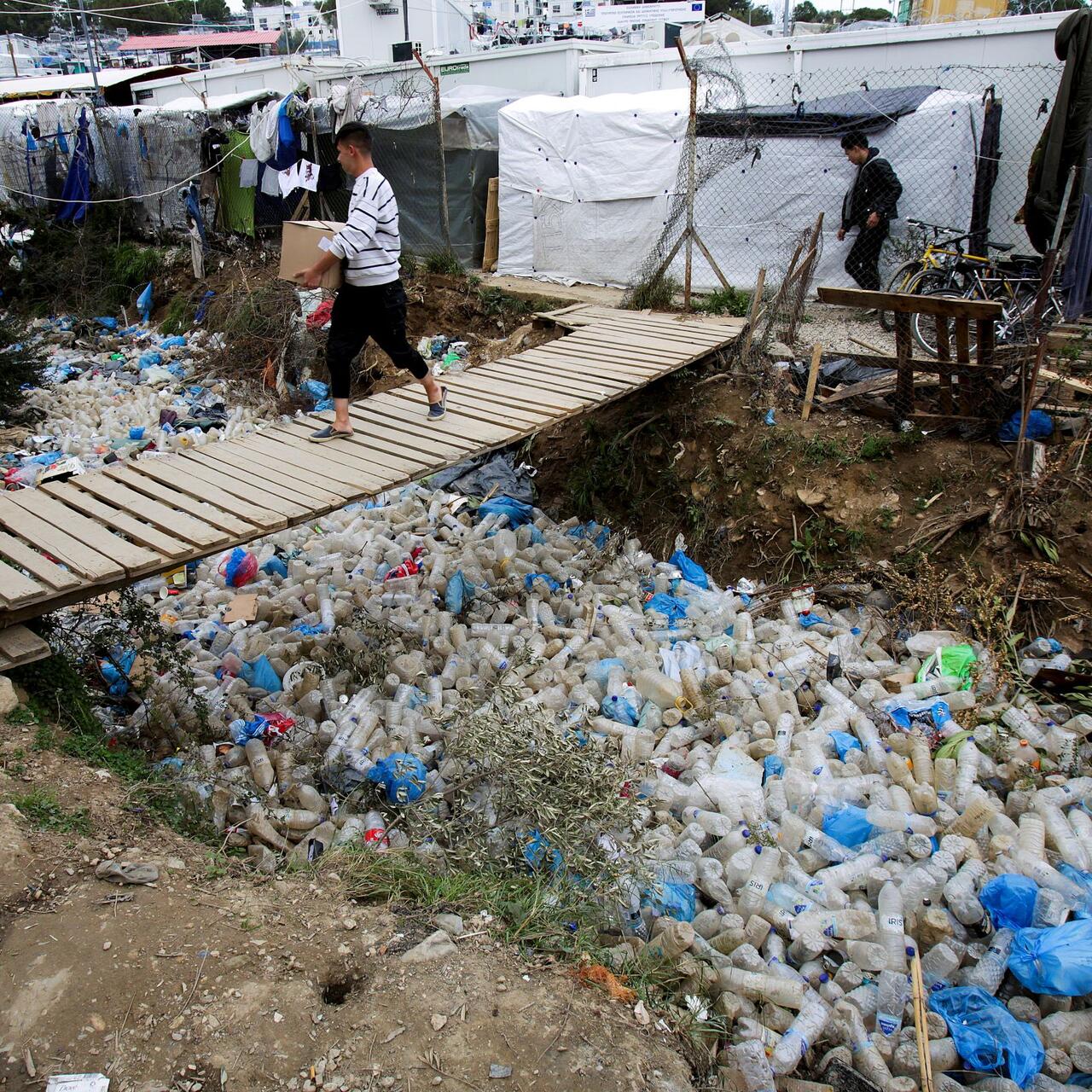
24-year-old RA*, from Afghanistan, describes the threats facing himself and other refugees stuck on the islands in Greece as the coronavirus spreads around the world.
Medical professionals say people should wash their hands, but we only get water a few hours a day. They say people should stay two metres apart, but we live amongst 20,000 other people who have to queue for food and the toilet. We are all living so close together – it’s not possible to ‘stay home’ or practice ‘social distancing’.
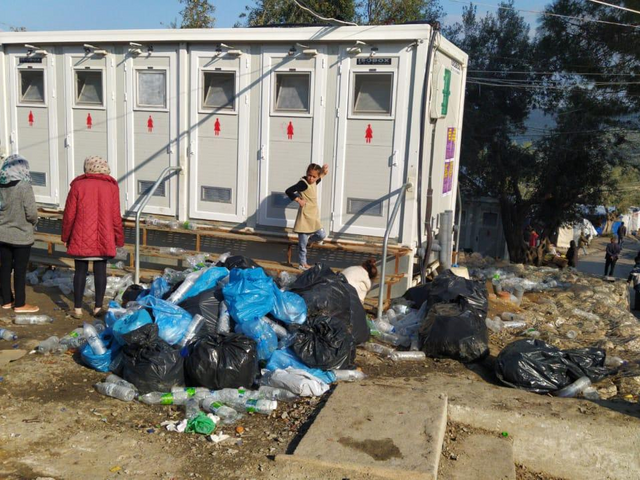
Moria on the Greek island of Lesvos
This is Moria on the Greek island of Lesvos, home to thousands of refugees, including me. If one person with the coronavirus comes to the camp – I promise, all of the people in the camp will get it. People over 50 will die, people with heart and lung disease will die. A lot of people will lose someone that they love. It’s a nervous atmosphere in the camp. It’s the coronavirus, it’s not a joke.
We cannot behave like people do in the UK. You’re staying at home, cleaning your home, washing yourself, not going to crowded places. But here? We have to stand in line for food. We have to stand in line to shower. And these lines are really crowded. I see so many old people in those lines and it makes me feel really sad because I know that if the coronavirus comes – most of them will die.
There are rumours that go around, people believe that if you wear a mask you can’t get it or that if you stay in the sun, you can’t get it. It’s not their fault they believe these things, it’s just difficult to get good information.
I’m volunteering in the community to provide information about the coronavirus and some of the ways people should behave. Many people don’t know exactly what the coronavirus is, they know it’s a virus and it kills, but they don’t know much else.
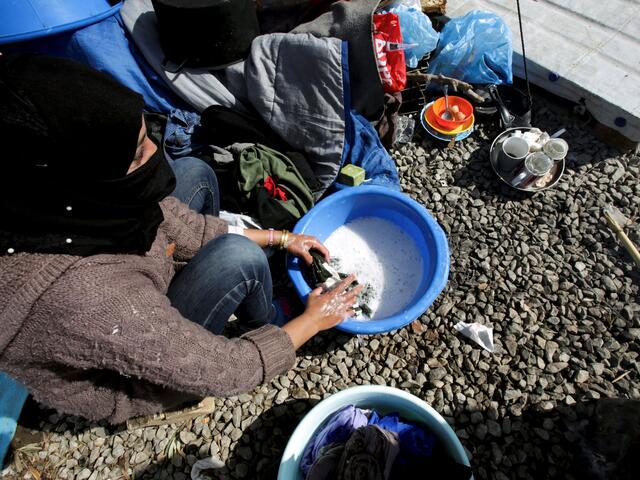
I feel it’s my duty to help people, to teach them how to behave with corona. We tell people to wash their hands as much as they can, to cough into their arms, to avoid touching their face, that there’s no cure, and to try and not go near other people.
There are three different kinds of places people live here. One of them is an ‘ISO Box’, which is a metal box like a shipping container. This is the best place people can stay – it has electricity, it’s like our heaven. But it also comes with problems - one ISO Box is meant for one family, but there are several families living in one. The second is what we make ourselves – with wood and tarpaulin. That’s where I live – it’s about 4x4 metres wide, and I live with seven other people. The third is the tents, this is the worst situation – rain, wind, water, cold weather, animals and insects go inside, everything can affect it.
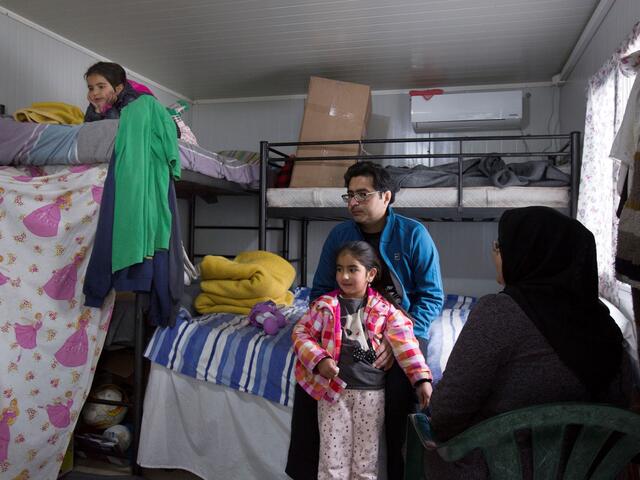
I know people in other countries become nervous and anxious because they are staying inside. People in Moria know that staying home is good for themselves and for other people – they’re not angry with staying – but they cannot because they need to get food and go to the bathroom. If they didn’t have to go to the lines, they would stay at home to protect their health.
In my opinion, they cannot stop the coronavirus coming into the camp. We need good services to protect against it – that’s water 24/7, soap for refugees to wash their hands, hand sanitiser, masks and good medical teams so that if someone gets it, they can get help fast.
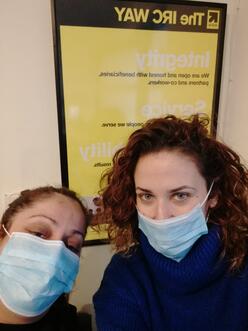
I want people in the European countries to know that we are humans, all of us have reasons to come here. No one would come here and leave behind their parents and their home, without an important reason. Please pay attention to us: we have kids, we have old people, we have children without parents, alone girls and people with bad health.
People here have fled bad situations in their countries. In Afghanistan, where I’m from, and in Syria, there are terrorist groups. People have been tortured and they are tired.
We are all humans – skin colour, borders, language are not important. The one thing that is important is being human. Every person deserves to have safety. We're unlucky just because of where we're born. But that doesn't mean we deserve to die.
How the IRC is responding to the coronavirus in Lesvos
The IRC provides sanitation, toilets and toiletries to camps in Lesvos, as well as mental health support to asylum-seekers living in Moria. Our teams have been preparing for the outbreak by ensuring staff have access to personal protective equipment and informing people living in the camps about how to prevent the spread of the coronavirus, as well as by offering counselling sessions via telephone rather than in person. The IRC is also launching Refugee.Info on the islands, a service that uses Facebook to answer people’s questions about the coronavirus and combat misinformation. Read 5 reasons why it’s near-impossible for refugees to follow guidance on coronavirus.
*RA is a pseudonym used on request of the writer.